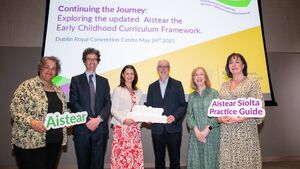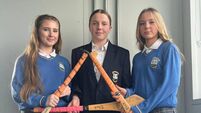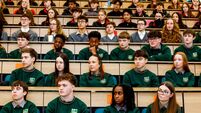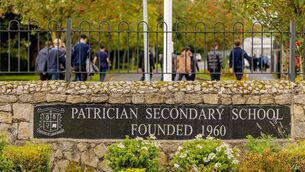Maynooth Uni study leads policy on early learning

L-R: Prof Iram Siraj, Froebel Department of Primary and Early Childhood Education, Maynooth University; Toby Wolfe, Principal Officer at Department of Children, Disabilty and Equality (DCDE); Arlene Forster, Chief Executive NCCA, Seán Ó Foghlú, Social Sciences, Maynooth University and DCDE Assistant Chief Inspector Maresa Duignan and Chief Inspector Yvonne Keating.
Two education reports by Maynooth University academics will inform national policy on early childhood learning.
Minister for Culture, Communications, and Sport, Patrick O’Donovan and Minister for Children, Disability and Equality, Norma Foley recently launched ‘Principles for Engaging with the Arts: A Guide for Early Learning and Care and School-Age Childcare’.
Led by Dr Tríona Stokes, of Maynooth University’s Froebel Department of Primary and Early Childhood Education, the review examines the work of the Department of Children, Disability and Equality (DCDE) in developing key principles to underpin young children’s quality engagement with the arts in early learning and care (ELC) settings.
This work was grounded in the Department’s ‘FirstFive, the Whole-of-Government Strategy for Babies, Young Children and their Families, 2019-2028’ and the department’s participation in, and commitment to, the Creative Ireland Programme.
The full report and discussion paper, available here, note that the report, and corresponding professional learning opportunities and resources, will support the provision of quality, enriching arts and creativity experiences for children from birth.
Separately, a report commissioned by the National Council for Curriculum and Assessment (NCCA) titled ‘An Emergent and Inquiry-based Curriculum Approach in Early Childhood’ was led by Professor Iram Siraj, a Distinguished International Collaborator at Froebel Department of Primary and Early Childhood Education.
Prof Siraj is Emeritus Professor of Child Development and Education at the Department of Education, University of Oxford.
This review complements the early childhood curriculum framework Aistear and the Guidance for Good Practice by seeking to show what an emergent and inquiry-based curriculum approach looks like for babies, toddlers and young children. It also outlines how such an approach can help educators to facilitate and support progression in learning.





